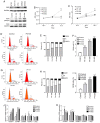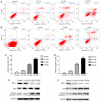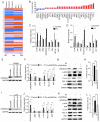Progesterone suppresses the progression of colonic carcinoma by increasing the activity of the GADD45α/JNK/c‑Jun signalling pathway
- PMID: 33846816
- PMCID: PMC8054317
- DOI: 10.3892/or.2021.8046
Progesterone suppresses the progression of colonic carcinoma by increasing the activity of the GADD45α/JNK/c‑Jun signalling pathway
Abstract
Colorectal cancer (CRC) is the third most diagnosed cancer worldwide. Progesterone is associated with a decreased risk of CRC and leads to a favourable prognosis. However, the specific mechanism by which progesterone suppresses malignant progression remains to be elucidated. In the present study, the level of progesterone was first analysed in 77 patients with CRC, and immunohistochemistry was performed to detect the expression of progesterone receptor (PGR) in the paired specimens. The correlations between progesterone, PGR and CRC prognosis were assessed. A Cell Counting Kit‑8 assay was then used to detect proliferation of the CRC cells. Flow cytometry was performed to estimate apoptosis and to evaluate the cycle of the CRC cells. A xenograft tumour model was established in nude mice to assess the role of progesterone in tumour growth. Finally, a PCR microarray was used to screen differentially expressed genes to further interpret the mechanism by which progesterone inhibits the malignant progression of CRC. It was found that low expression of progesterone and PGR were significantly associated with poor prognosis of CRC. In addition, progesterone suppressed CRC cell proliferation by arresting the cell cycle and inducing apoptosis in vitro. Moreover, the inhibitory role of progesterone in tumour growth was verified in vivo. Further investigation showed that the level of growth arrest and DNA damage‑inducible protein α (GADD45α) was up‑regulated by progesterone, and this was followed by the activation of the JNK pathway. Progesterone increased the activity of the JNK pathway via GADD45α to inhibit proliferation by arresting the cell cycle and inducing apoptosis, thereby suppressing the malignant progression of CRC. Therefore, it can be concluded that progesterone and PGR might act as inhibiting factors for poor prognosis of CRC.
Keywords: progesterone; colorectal carcinoma; proliferation; c‑Jun N‑terminal kinases; GADD45α.
Conflict of interest statement
The authors declare that they have no competing interests.
Figures





Similar articles
-
Impact of GFRA1 gene reactivation by DNA demethylation on prognosis of patients with metastatic colon cancer.World J Gastroenterol. 2020 Jan 14;26(2):184-198. doi: 10.3748/wjg.v26.i2.184. World J Gastroenterol. 2020. PMID: 31988584 Free PMC article.
-
CSRP2 suppresses colorectal cancer progression via p130Cas/Rac1 axis-meditated ERK, PAK, and HIPPO signaling pathways.Theranostics. 2020 Sep 2;10(24):11063-11079. doi: 10.7150/thno.45674. eCollection 2020. Theranostics. 2020. PMID: 33042270 Free PMC article.
-
Paxillin knockdown suppresses metastasis and epithelial‑mesenchymal transition in colorectal cancer via the ERK signalling pathway.Oncol Rep. 2020 Sep;44(3):1105-1115. doi: 10.3892/or.2020.7687. Epub 2020 Jul 14. Oncol Rep. 2020. PMID: 32705241 Free PMC article.
-
Cyclovirobuxine D inhibits colorectal cancer tumorigenesis via the CTHRC1‑AKT/ERK‑Snail signaling pathway.Int J Oncol. 2020 Jul;57(1):183-196. doi: 10.3892/ijo.2020.5038. Epub 2020 Apr 3. Int J Oncol. 2020. PMID: 32319595 Free PMC article.
-
Selective β2-AR Blockage Suppresses Colorectal Cancer Growth Through Regulation of EGFR-Akt/ERK1/2 Signaling, G1-Phase Arrest, and Apoptosis.J Cell Physiol. 2016 Feb;231(2):459-72. doi: 10.1002/jcp.25092. Epub 2015 Sep 1. J Cell Physiol. 2016. PMID: 26189563
Cited by
-
Enhanced anti-cancer effects of oestrogen and progesterone co-therapy against colorectal cancer in males.Front Endocrinol (Lausanne). 2022 Oct 3;13:941834. doi: 10.3389/fendo.2022.941834. eCollection 2022. Front Endocrinol (Lausanne). 2022. PMID: 36263327 Free PMC article.
-
Incidence, Risk and Trends of Multiple Primary Cancers in Patients With Colorectal Cancer: Evidence From the South Australian Cancer Registry.Cancer Med. 2025 Jun;14(11):e70984. doi: 10.1002/cam4.70984. Cancer Med. 2025. PMID: 40444502 Free PMC article.
-
17β-estradiol Enhances 5-Fluorouracil Anti-Cancer Activities in Colon Cancer Cell Lines.Med Sci (Basel). 2022 Oct 28;10(4):62. doi: 10.3390/medsci10040062. Med Sci (Basel). 2022. PMID: 36412903 Free PMC article.
-
Profiling estrogen, progesterone, and androgen receptors in colorectal cancer in relation to gender, menopausal status, clinical stage, and tumour sidedness.Front Endocrinol (Lausanne). 2023 May 3;14:1187259. doi: 10.3389/fendo.2023.1187259. eCollection 2023. Front Endocrinol (Lausanne). 2023. PMID: 37206439 Free PMC article.
-
Role of gonadally synthesized steroid hormones in the colorectal cancer microenvironment.Front Oncol. 2023 Dec 5;13:1323826. doi: 10.3389/fonc.2023.1323826. eCollection 2023. Front Oncol. 2023. PMID: 38115900 Free PMC article. Review.
References
-
- Tsai HW, Ho CL, Cheng SW, Lin YJ, Chen CC, Cheng PN, Yen CJ, Chang TT, Chiang PM, Chan SH, et al. Progesterone receptor membrane component 1 as a potential prognostic biomarker for hepatocellular carcinoma. World J Gastroenterol. 2018;24:1152–1166. doi: 10.3748/wjg.v24.i10.1152. - DOI - PMC - PubMed
Publication types
MeSH terms
Substances
LinkOut - more resources
Full Text Sources
Other Literature Sources
Research Materials
Miscellaneous

